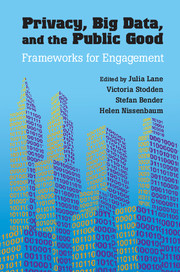Editors’ Introduction
Published online by Cambridge University Press: 05 July 2014
Summary
Massive amounts of data on human beings can now be accessed and analyzed. And the new ‘big data’ are much more likely to be harvested from a wide variety of different sources. Much has been made of the many uses of such data for pragmatic purposes, including selling goods and services, winning political campaigns, and identifying possible terrorists. Yet big data can also be harnessed to serve the public good in other ways: scientists can use new forms of data to do research that improves the lives of human beings; federal, state, and local governments can use data to improve services and reduce taxpayer costs; and public organizations can use information to advocate for public causes, for example.
Much has also been made of the privacy and confidentiality issues associated with access. Statisticians are not alone in thinking that consumers should worry about privacy issues, and that an ethical framework should be in place to guide data scientists; the European Commission and the U.S. government have begun to address the problem. Yet there are many unanswered questions. What are the ethical and legal requirements for scientists and government officials seeking to use big data to serve the public good without harming individual citizens? What are the rules of engagement with these new data sources? What are the best ways to provide access while protecting confidentiality? Are there reasonable mechanisms to compensate citizens for privacy loss?
Information
- Type
- Chapter
- Information
- Privacy, Big Data, and the Public GoodFrameworks for Engagement, pp. xi - xxPublisher: Cambridge University PressPrint publication year: 2014
References
Accessibility standard: Unknown
Why this information is here
This section outlines the accessibility features of this content - including support for screen readers, full keyboard navigation and high-contrast display options. This may not be relevant for you.Accessibility Information
- 2
- Cited by
